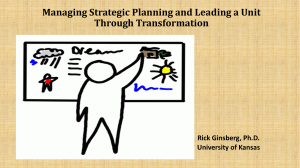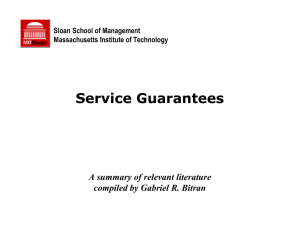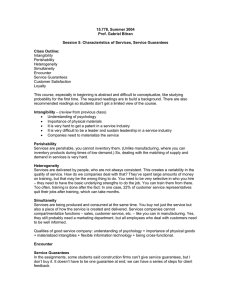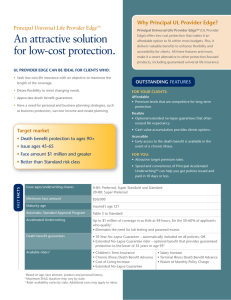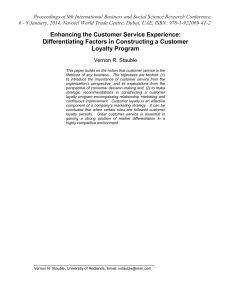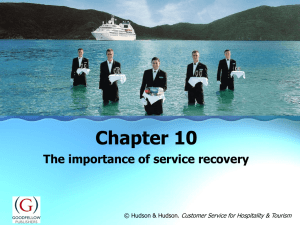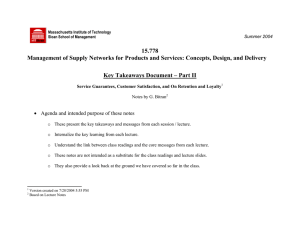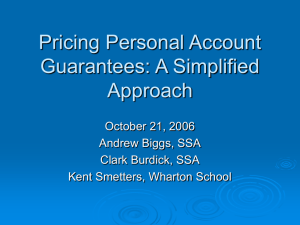15.778, Summer 2004 Prof. Gabriel Bitran Class Outline:
advertisement
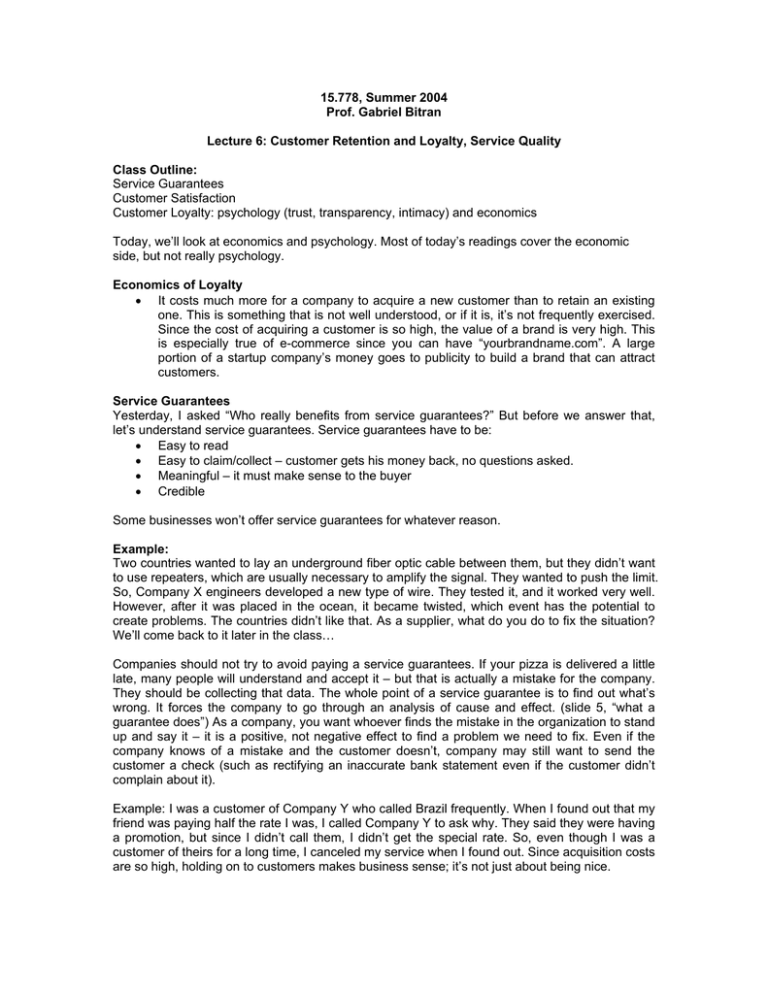
15.778, Summer 2004 Prof. Gabriel Bitran Lecture 6: Customer Retention and Loyalty, Service Quality Class Outline: Service Guarantees Customer Satisfaction Customer Loyalty: psychology (trust, transparency, intimacy) and economics Today, we’ll look at economics and psychology. Most of today’s readings cover the economic side, but not really psychology. Economics of Loyalty • It costs much more for a company to acquire a new customer than to retain an existing one. This is something that is not well understood, or if it is, it’s not frequently exercised. Since the cost of acquiring a customer is so high, the value of a brand is very high. This is especially true of e-commerce since you can have “yourbrandname.com”. A large portion of a startup company’s money goes to publicity to build a brand that can attract customers. Service Guarantees Yesterday, I asked “Who really benefits from service guarantees?” But before we answer that, let’s understand service guarantees. Service guarantees have to be: • Easy to read • Easy to claim/collect – customer gets his money back, no questions asked. • Meaningful – it must make sense to the buyer • Credible Some businesses won’t offer service guarantees for whatever reason. Example: Two countries wanted to lay an underground fiber optic cable between them, but they didn’t want to use repeaters, which are usually necessary to amplify the signal. They wanted to push the limit. So, Company X engineers developed a new type of wire. They tested it, and it worked very well. However, after it was placed in the ocean, it became twisted, which event has the potential to create problems. The countries didn’t like that. As a supplier, what do you do to fix the situation? We’ll come back to it later in the class… Companies should not try to avoid paying a service guarantees. If your pizza is delivered a little late, many people will understand and accept it – but that is actually a mistake for the company. They should be collecting that data. The whole point of a service guarantee is to find out what’s wrong. It forces the company to go through an analysis of cause and effect. (slide 5, “what a guarantee does”) As a company, you want whoever finds the mistake in the organization to stand up and say it – it is a positive, not negative effect to find a problem we need to fix. Even if the company knows of a mistake and the customer doesn’t, company may still want to send the customer a check (such as rectifying an inaccurate bank statement even if the customer didn’t complain about it). Example: I was a customer of Company Y who called Brazil frequently. When I found out that my friend was paying half the rate I was, I called Company Y to ask why. They said they were having a promotion, but since I didn’t call them, I didn’t get the special rate. So, even though I was a customer of theirs for a long time, I canceled my service when I found out. Since acquisition costs are so high, holding on to customers makes business sense; it’s not just about being nice. Often, services are viewed to be a second-rate part of a company. They know they have to have a call center, but they don’t adequately staff it. In fact, since the world is changing very quickly – there are enormous opportunities for businesses that offer superior service. Question: In the Company Y example, might it be cheaper to lose a few customers than to give everyone the discount? Superior firms often don’t (have to) stop to analyze every little decision. They set a new level of service as the standard and view it as a money-making proposition. One example is FedEx, who made a calculated risk to set up their call center without doing an elaborate cost analysis. They used their intuition. The biggest obstacle for service guarantees are lawyers because they want very long, confusing contracts. People often assume – wrongly – that it costs more to provide good service than it does to provide poor service. Often, that’s just an incorrect mental model people assume. Peter Senge’s “The Fifth Discipline” says we all have mental models, leading to conflicts if we don’t explain our models and assumptions to others. It may actually cost the same or less to provide superior service: you save in employee retention; you retain more customers, etc. Yes, some companies have spent a lot of money on service and gone out of business. But there is no doubt that we can do better for less – one example is the Merrill Lynch case. We need to pair productivity with customer satisfaction (yesterday’s diagram). There are many reasons for a company not to offer a service guarantee. Many old, established companies do not. Customers trust them and are therefore loyal. The benefit of a service guarantee is higher when: • the price of service is high • the customer ego is on the line • the level of the customer expertise with the service is low • the negative consequences of service failure are high • customer’s image of service quality in the industry is low • the company depends on a high rate of customer repurchase The benefits for the company offering a service guarantee are just as big as they are for the customer. Don’t just offer a guarantee for the customer’s sake. Example: the airline contract mandated by Congressional lawmakers (?) helped those airlines get back in touch with customers. If a big company has a service guarantee, it can sometimes offer a significant advantage over other big companies. Can our competition company offer all of our guarantees? Returning to our question from earlier: What should we do about underwater cable problem? The decision was to replace the system so countries end up with two parallel cables. Yes, it was costly, but it spurred loyalty among customers, which is a benefit you can’t really quantify. “Service Quality” Slides Be conscious of the following duality: good service and customer loyalty are not the same, though you need good service as prerequisite for loyalty. How can you define quality in services? It’s easy to define in manufacturing (you have tolerances and specifications); but since services are intangible, how do you create specifications? Customers expect something and compare it to their perception of what they received. Expectation determined by: word of mouth, personal needs, past experience, external communications, etc. Do we give customer more than they expect? (This is related to the expanding customer expectations diagram from earlier in the course.) Expectation is a dynamic process: it’s like trying to hit a moving target all the time. So to try and protect ourselves, we give the customer a little more than they expect. It’s like an insurance policy that benefits the company. It retains customers and saves money if we understand what we’re doing and not just giving it away. The science of service is emerging, driven by psychology. Companies have to do business differently to continually give more. If a company reinvents themselves, maybe they can give more for less because of the learning effect. Learning only takes place when we change. So if an origination learns, they change all the time. But often they don’t know how to learn – they may learn as a bunch of individuals, but not as an institution. Dimensions of Service Quality Which do you think is most important? • Tangibles • Reliability • Responsiveness • Competence • Courtesy • Credibility • Security • Access • Communication • Understanding the customer In a study, they found reliability is most important. Though there are many good companies today, they’re not good enough. Customers are satisfied with what they get, but it’s not good enough. Reflect on this outcome and understand the difference between satisfaction and loyalty. You can be satisfied if one company is the only option. Loyalty, however, is far above satisfaction.
